I sat at the dining room table at the Airbnb in Washington the morning of my trail marathon, googling “how to DNF a race” while eating my banana and oatmeal. “Did Not Finish” felt like just another way of saying “failed” to me.
I felt lost in my own worry and anxiety, not yet nervous, but not feeling confident at all. The race would begin in an hour and a half, and what I felt sure of, was that there was maybe a 15-20% chance I would finish the 26.1-mile race today.
I had bruised my rib 2 ½ weeks prior in a fall on the stairs in my house, and hadn’t been able to run very far at all without pain since then. Despite this, I had traveled up to Orcas Island, a 6-hour drive from Oregon followed by an hour-long ferry ride the day before with my friend who would be doing the race, my boyfriend, and my dog. I brought along my heating pad along with all my clothing options for race day. I was committed to at least trying, and figured I could likely at least do the first half up to the aid station at mile 13 even if my ribs were still sore. The race was set up in a way that it would actually be easy to get back to the start halfway through, so sort of an ideal race to not finish.
It wasn’t that I didn’t know how to not finish a race, (it’s pretty obvious that you just stop running and then try to find the nearest aid station or race volunteer to let them know), but I didn’t know how to mentally cope with the idea of it. Google noted on various websites the valid reasons to DNF a race, as well as reasons not to. I knew I should make the best decision for my body and that there would be another race in the future and another day to run. But, still, I hated the idea of how I would feel mentally by not finishing. How I would watch the other racers smile, despite the exhaustion and tiredness, at the finish line while friends, family, and complete strangers cheered them on. How I hated to feel that the months of training in cold, wet, and even snowy conditions this winter weren’t going to pay off in me crossing that finish line today. I really wanted to want it, but I also felt it wasn’t a mental decision. It would be a physical one, one where I had to trust my body, which after all this time, is still so ridiculously hard to do.
I am still new to ultrarunning and long distances. I had completed my first 50k the year prior and had done some adventure runs with friends that were over 20 miles. But, this was the 2nd longest race I had signed up for, and currently the only one on my calendar for this season. I knew that a big part of distance running is mental, and I didn’t know how to feel going into a race without knowing I could finish. Of course, no one ever truly knows that they will finish. Some things are out of our control, but I didn’t have a mindset of feeling prepared, feeling ready, or just wanting to have fun like I’ve usually had before a race. A sense of calm, and a sort of “I think I’ve got this” type of feeling. Instead, I felt like an outsider at the finish line that morning, starting with a group of runners who were there to run a marathon. I was really nervous, and I didn’t feel like I was going to run a marathon that day. And even more than that, did I even love running long distances or putting the pressure on myself instead of just sticking to easier distances? I wasn’t sure of much at that moment when the race began.
If someone asks me when I started to love running, I would say, like most relationships and answers, it is complicated. It’s like when someone asks me where I am from. The short answer is that I grew up in North Dakota and moved to some other places until I ended up in Oregon, which feels more like home than anywhere I’ve lived. The longer answer is more complicated, with lots of starting lines and finish lines, geography and trails that twists and re-route and sometimes loops back again, much like the sometimes messy GPX files of a race course map.
My love for running also had starting lines and finish lines, and is still growing in different and sometimes complicated ways.
I know that I loved running as a kid, running across our green lawn in the summer, wet from sprinklers or morning dew. I ran to get places quicker, to catch up to others, or to just play. And then, as a not-athletic and shy teenager, running felt like a punishment in gym class, a way to warm up to play sports I didn’t feel confident in and didn’t like, and running a mile was a once-a-year test to prove some arbitrary level of fitness. I wasn’t fast, it made my sides hurt, and I saw no use for it.
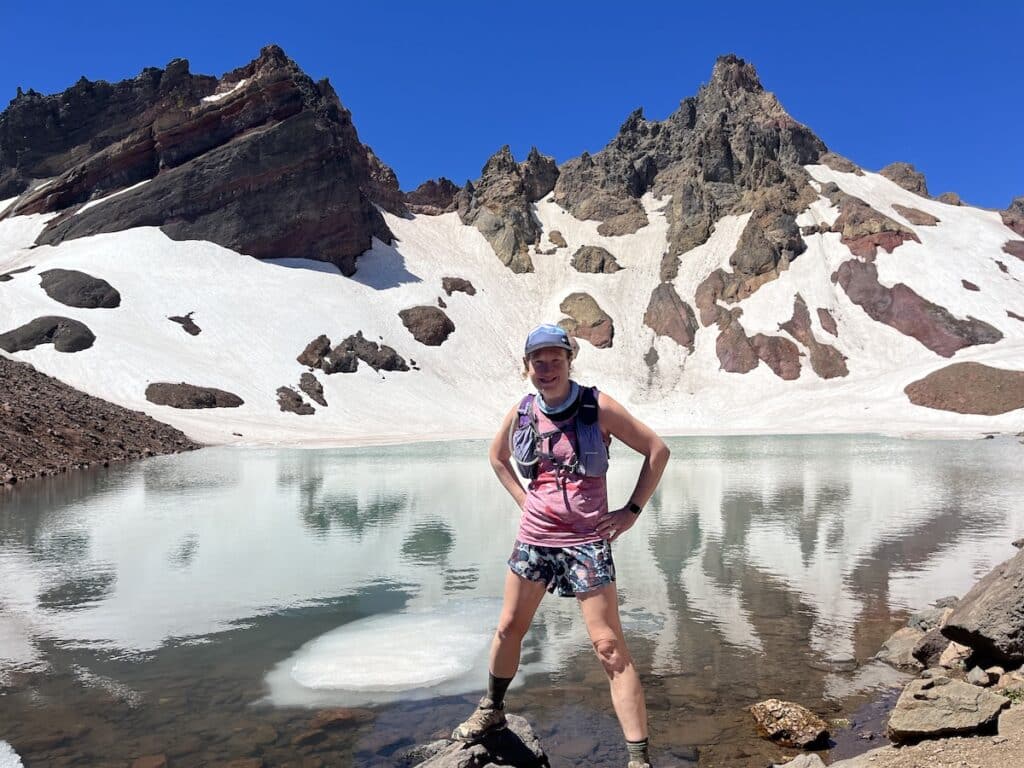
After college, I joined a gym in an attempt to lose weight, get fit, and feel confident about myself because I didn’t feel like I had much direction at that time and I didn’t like myself very much because of it. Getting fit and thinner was something I could become good at. I liked the structure, I made up rules around food and eating, I worked out more and more, and people praised me for it. I started to smile again, and started to think of myself as someone who was fit. I began to run on a treadmill until I could run 4 miles. I didn’t necessarily like it, but it was an efficient way to burn calories and I could see the appeal. I moved to Portland, Oregon, where I learned more about myself than maybe I ever had before, on my own, in an entirely new environment. I worked for Americorps and had a physical job in the woods most days, and running became more exhausting. It would give me such anxiety if I couldn’t finish 4 miles on the day I had planned to run 4 miles at the gym, that I eventually told myself I didn’t need to run anymore. I did everything else: biking, hiking, yoga, elliptical, stairs, weights, kickboxing, etc. I didn’t smile much anymore. I was too tired. Running was something I felt o.k. to cut out of my life, like a relationship that had lost its relevance. Something that wasn’t for me anymore.
Portland had a finish line for me, financially and mentally, and I moved back to the Midwest and went to graduate school after a few years and worked out and continued to restrict myself to the point I was a ghost to myself. Skeletal and anxious all the time, and was told I would likely die if I didn’t get help, as I sat in the office at the Eating Disorder Institute in Fargo when I was 30 years old.
Going to therapy, gaining weight, gaining muscle, and regaining confidence was a new starting line. It took time and it was sometimes so hard to not know where the finish line would be, when I would really feel o.k. in my body again. I stubbornly didn’t ask for much help, and I did a lot of it on my own, after moving to Ohio after grad school for my first job. I didn’t trust myself to work out or run for a long time. I did go for long walks with my new adopted puppy, before eventually starting to do yoga classes, and then going to the gym again in a more balanced and healthy way. Still, I didn’t run, until right before I left Ohio. I had started to run loops in the park with my dog who had endless energy that spring. I decided that a 5k would be a fun goal to try. The weekend before I left Ohio for my new job in Oregon, I ran my first 5k and felt an amazing sense of accomplishment when I crossed that finish line. I felt like a true runner for the first time in my life. And I wasn’t doing it to lose weight. I was doing it to lose anything. I was running to gain something. Strength, confidence, and power. A connection to something more.
Back in Oregon, I ran more, feeling excited by the variety and diversity of running paths and trails. I ran while listening to some guided runs which helped me to realize that sometimes runs feel awful the whole time, and that’s o.k. Sometimes runs are just about recovery, some are about getting over stress, some are just about enjoying conversation with a running friend or escaping for a few miles. I learned to love running when I gave up expectations for what I wanted it to fix in my life and learned to love it for what it was. A way to move my body, a way to find community, a way to find new adventures and discovery, and friends. To get back to that sense of play and wonder that I felt like a kid, hugging tall trees, taking photos, and finding new ways back to myself as I connected trails. I found a way to have more starting lines and finish lines. It wasn’t there to fix me or define me. It was there, like a long-lost old friend, calling me to catch up and reconnect.
When I discovered trail running, I learned that it was an amazing way to combine my love for nature while testing my limits of my body and mind. It was accessible, as I fortunately live in a place with a vast system of trails. All I needed were my trail shoes and a running vest. I met more trail friends, and we ran new trails together, and I signed up for my first half-marathon, then my 2nd and my 3rd. And then, what had seemed impossible, a 50K. That first 50k was really hard, full of mud and unexpected difficulty, but I never once thought of quitting, as I had so many friends cheering me on. I cried crossing that finish line, feeling so proud of what I had accomplished.
And as in most relationships, running isn’t always easy, in fact, it rarely is for me. Training is hard, and it takes so much time (especially when you aren’t a fast runner). Injuries are difficult to manage, and sometimes life feels even more difficult to manage without running when it is your stress relief, your “therapy” time to chat with friends, and your escape. Saturday mornings are scheduled out for long runs for months, and choices with your time and other relationships have to be made. Sometimes I overthink my pace when I can’t keep up with others and compare myself to others when I see them doing longer routes or faster times. Sometimes I overthink my nutrition and eating habits and feel anxious or overwhelmed.
But in those wonderful magical moments of sun peaking through the ferns across the trail, in a kind word of encouragement from a runner you pass, the snacks you stop to eat while you regain some energy to keep going, the times you pause to take a photo or hug a tree, to the moments back at the car or the finish line or the trailhead after you know you have just done something that felt to so good for yourself and you give yourself a little high-five or pat on the back, it all feels worth it.
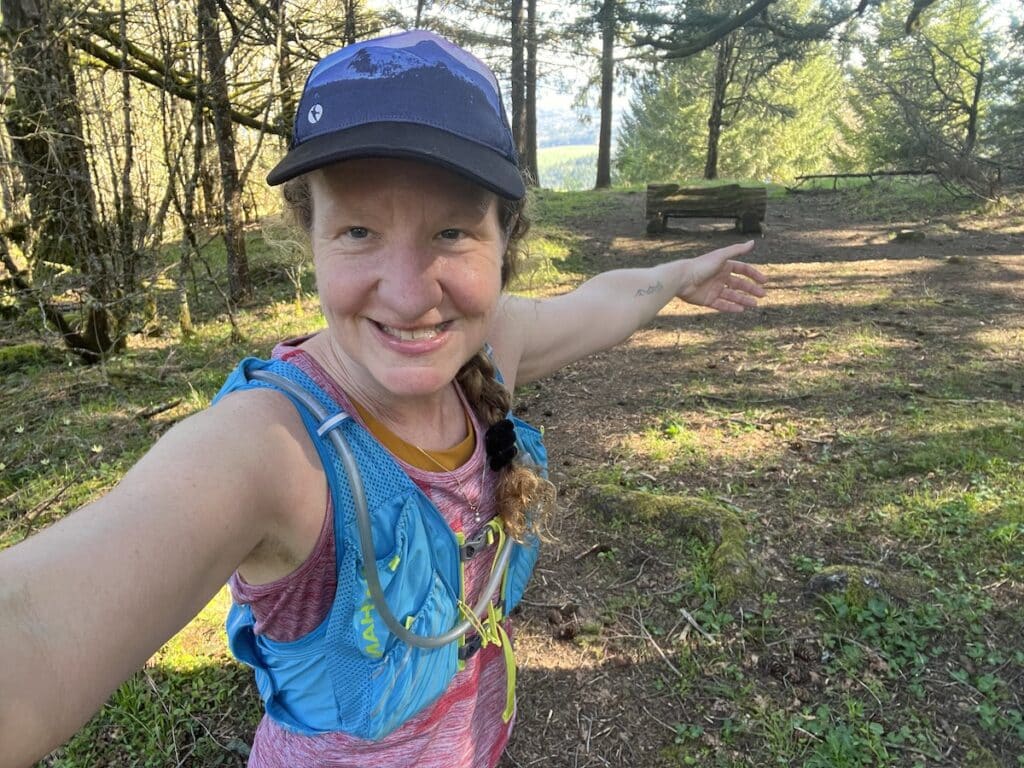
And so, while I didn’t know at that moment while eating my breakfast at the Airbnb if I’d cross the finish line that day, I did know that I would be at the starting line. And even if it didn’t feel like it at the time, maybe that is what is more important than all the rest. We don’t ultimately have control in how things end up, but we do have control of how we show up. Of all the things running has taught me, this is perhaps the most important thing.
I was able to surprise myself and continue on to finish the race that day, when I found my ribs weren’t really hurting on the run. And while the race was hard and challenging, it was also beautiful and filled with kind people who said encouraging things along the way. I pushed myself, physically and mentally, and beamed with pride at the finish line where I got to hug my friend and boyfriend, and nearly cried from all the encouragement from strangers. And I can’t help but think that in running and in life, those are the absolute best kind of finish lines. Unexpected, hard-earned, filled with love, kindness and overflowing with gratitude. And the best part? We get to start it again, somewhere down the road or trail, at another starting line.



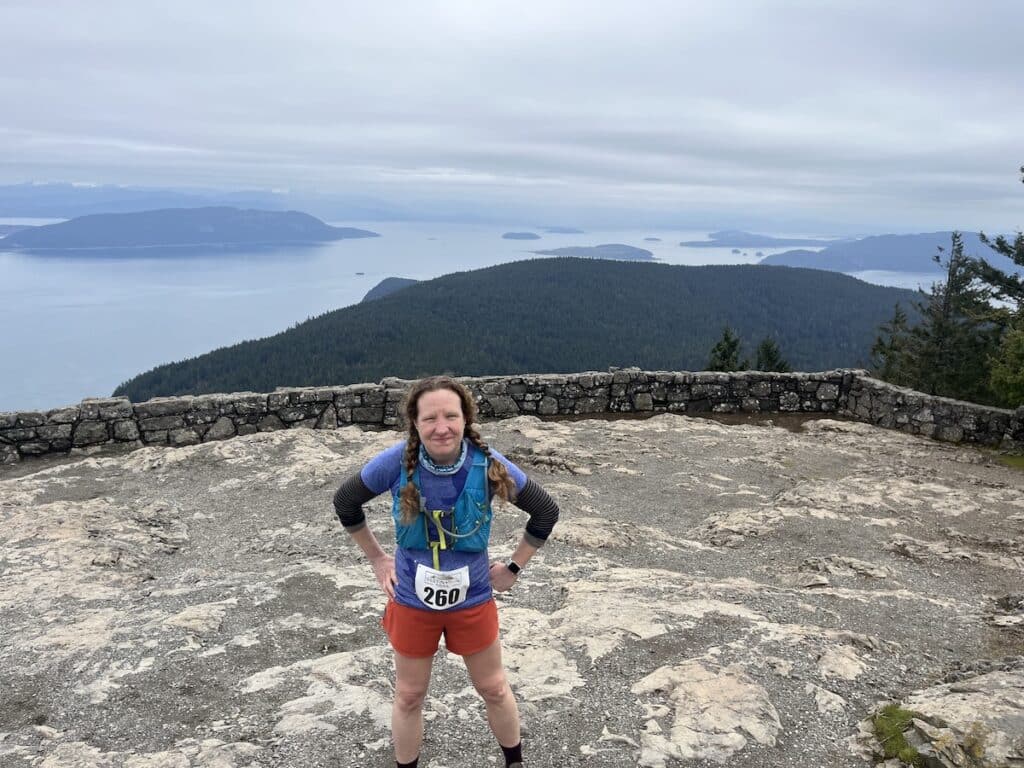
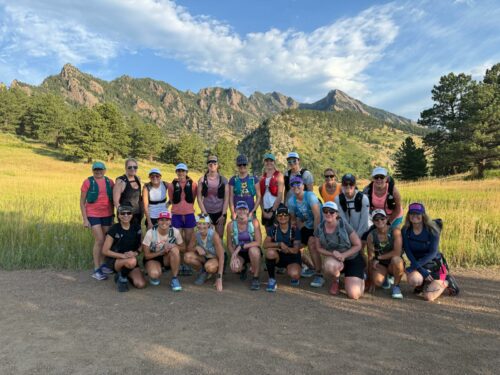
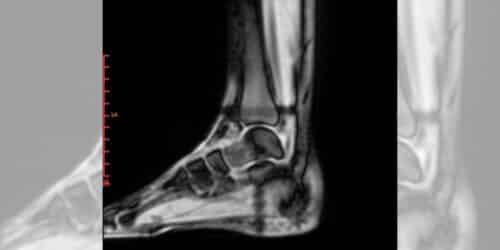


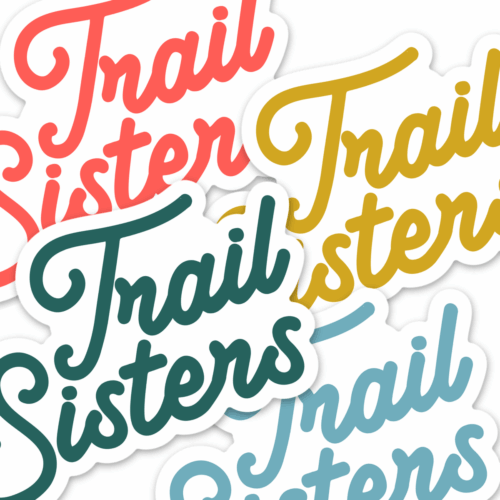

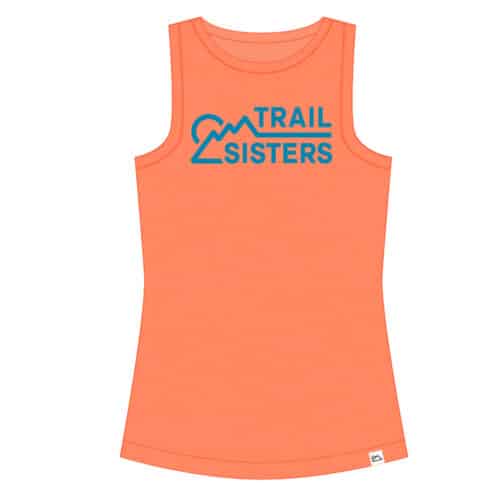
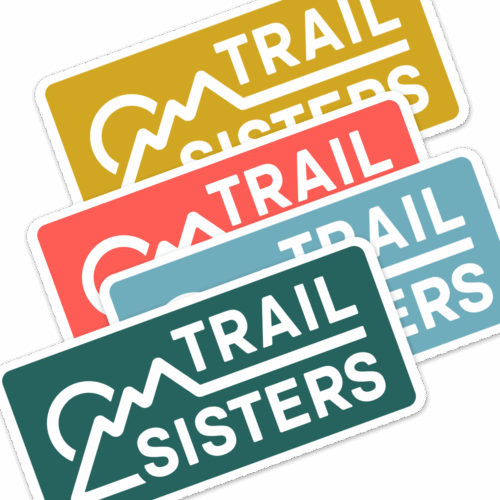

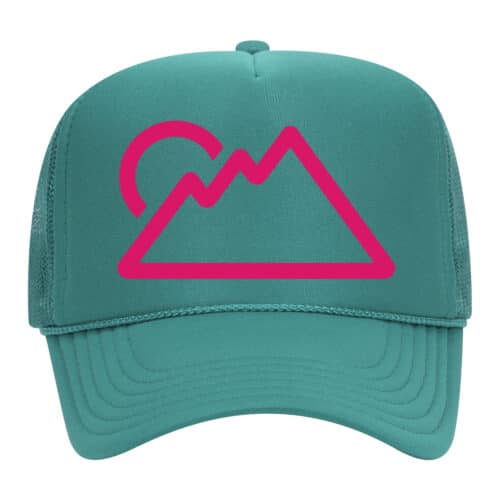


One Response
What a great story! So inspiring!